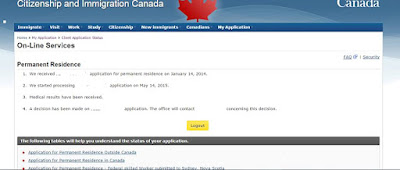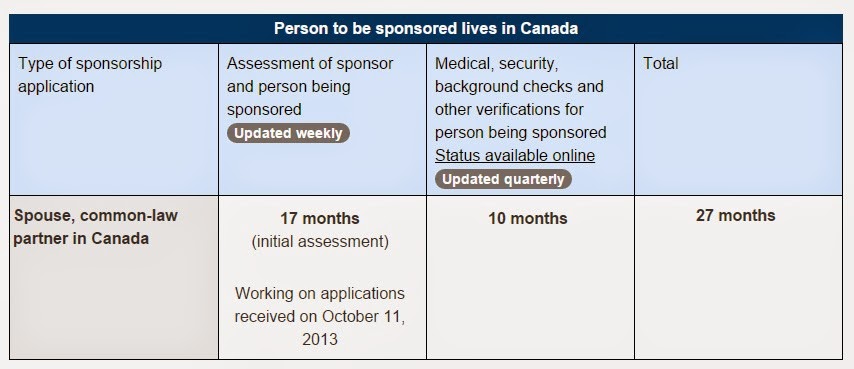The first immigration category that caught our attention was the one
affecting Canadians marrying non-Canadians already in the country: Inland Spousal Sponsorship.
Officially known as
Sponsorship of spouses or common-law partners under the Family Class category, this is
one of the immigration streams that has experienced the highest increase in processing times (1), as shown in this table (click to enlarge):
Due to the increase of processing times shown above, applicants for this category organized themselves through the Facebook group
Canada Inland Spousal Sponsorship petitioners (2), that gathers almost 2000 members to this date. Among the members, we found affected applicants, journalists and Government officials.
It all started by a
petition (3) created in Change.org. Later, all people who signed gathered in this group to organize actions, demonstrations and lobbying.
Lack of online monitoring system
When couples receive an
Acknowledgement of Receipt (AOR) of their application, normally around two months after they submit it, they are provided with an application number. According to the document sent by CIC, this number can be used to monitor the application, as shown in this screen capture from an official AOR (click to enlarge):
However, hundreds of applicants have reported through the Facebook group that
they are not able to track their progress online because
their application is not entered in the system for up to 8 months.
Updated forms posterior to the date of reception
In August, 2014,
Citizenship and Immigration Canada (CIC) changed one of the most important
forms (4) of the Sponsorship package, the
Sponsorship Agreement and Undertaking. This form is the one co-signed by both the Canadian sponsor and the non-Canadian spouse: the first agrees to sponsor the second and becomes responsible for the spouse for three years. They have to remain married or in common-law partnership during this period and the Canadian spouse is financially responsible for the non-Canadian spouse.
The reason for this update was a
change of the definition of dependent child (5) made by CIC. When sponsoring a spouse, the applicants must indicate if they have dependent children. The previous definition included children under 22 years, but the new definition reduced the maximum age to 19 years, impacting applicants with children.
By November, all applications sent after August 1st with the old form were returned to the couples, requesting to update this form to the most recent version. It didn't matter that the form was uploaded the same month, after they had already sent their applications.
All applicants,
including those who did not have children and the change didn't affect them, had to re-send their packages with the new form. Due to this change, which was not considered an update but a reset for their application, those who saw their packages returned
lost three months of processing times due to a technicality.
One of the applications returned due to outdated forms was first received by CIC in November, 2013. This couple lost an entire year due to a form that changed in August 2014.
Loss of status caused by CIC
Many of the non-Canadian spouses awaiting a decision are
asked to keep a valid status (3) while they wait, even though
out of status spouses are still eligible (6) to become Permanent Residents under this program.
Unfortunately,
one of the requirements to extend their valid status in Canada is to submit proofs of financial means (7), which they often can't provide because
they can't work, and their Canadian spouse supporting the entire family with a single income often doesn't have enough to show.
For that reason,
many couples resort to the Implied Status (8): while they still hold a valid status in Canada, they send their Sponsorship application with an application for an Open Work Permit, which could be granted
when the first stage approval is issued (9). Until the work permit application is processed, the valid status held at the moment of submitting the application is automatically extended.
Unfortunately, for those who saw their
packages returned in November to update a form that didn't exist when they first applied, this might have meant a
loss of status.
Pilot program for Open Work Permits
In 2015, CIC launched a
1-year a pilot program (10) aimed at granting
Open Work Permits valid for two years for foreign spouses of Canadians awaiting a decision on their sponsorship. Spouses who have already received
AOR and who had valid status in Canada were eligible for the pilot.
When the pilot started, applicants noticed that
these permits were not being issued in chronological order, and that many applicants were excluded from the program. Some of them, due to a loss of status caused by CIC as indicated previously.
When inquired about this by leaders of the
Canada Inland Spousal Sponsorship Facebook group at the end of January,
CIC's chief of staff, Chris Day, explained that "triaging applications and sorting them into the precise order each was received as part of the open work permit pilot program would actually take valuable resources away from processing work permits themselves and, thus, make eligible recipients wait longer. I hope you can appreciate that we chose to focus on processing work permits more quickly over behind the scenes file sorting".
This contradicts the statements made by CIC on their
website (11), where
they indicate that "applications are processed in the order in which they arrive."
Unfortunately,
CIC has not yet clarified why any of these situations happened, or why processing times increased from 14 to 25 months in total. More specifically, applicants wonder
why processing times for the first stage went from 6 to 17 months.
This first stage, for spouses who live outside of Canada, entitles the same process. Yet, the current times for the first stage under this stream is less than three months.
When inquired about the delays (12) and the difference of processing times between the outland and the inland stream, by Member of Parliament Nycole Turmel,
Minister Chris Alexander said that "contrarily, we have made a lot of progress in all streams since the arrival of this Government, and that includes the Family Sponsorship category (...)
applications are processed much faster now".
Requesting an audit
The official Critic for Citizenship and Immigration Canada, Lysane Blanchette-Lamothe, MP,
requested CIC information (13) on "budget, average wait times and staffing required to process visa applications between 2005 and 2014".
Blanchette-Lamothe didn't receive the information she requested after the 45-day period institutions have to reply to this kind of request. CIC replied that
gathering all this information would take time and resources that made a proper reply "unfeasible" in the allotted time.
For thar reason, the MP requested all emails regarding her request through the Access to Information Act. In that document, she found out that
the office in charge of gathering the requested information was "'inundated with high-priority requests' related to the Temporary Foreign Worker program".
The emails also unveiled a
Ministerial instruction to stop the data gathering and instead give the above mentioned reply to this request.
In a separate effort due to the lack of information about the reasons of the increase in processing times or measures to be taken to correct this issue,
affected couples are demanding the office of the Auditor of Canada to audit CIC. (14)
This
request (15), made through Change.org, is still awaiting a response.
Neither Blanchette-Lamothe, nor the affected couples, have yet found any clues about the reasons for the increase in processing times for the Inland Spousal Sponsorship program.
Follow us if you want to find answers as much as we do. Either an
affected applicant, a journalist or a concerned Canadian, this journey might interest you. Feel free to fill the form to your right to receive exclusive updates and information about our project.
--
Other links that might interest you:
Inland Sponsors' demonstration in Ottawa: Our first day of shooting
Why this affects you as a Canadian
--
Follow our progress on
Twitter
Sign up to our
newsletter
--
Sources:
1.
Processing times: Family Sponsorship. Citizenship and Immigration Canada. Retrieved: February 19, 2015. Previous processing times retrieved with web-archive.org.
2. Facebook group "
Canada Inland Spousal Sponsorship Petitioners".
3.
Petition: Improve processing time for Inland Spousal Sponsorship and Grant Open Work Permit Upon AOR. Change.org. Retrieved: February 19, 2015.
4.
Application to Sponsor a Member of the Family Class. Citizenship and Immigration Canada. Retrieved: February 19, 2015.
5.
Notice – Changes to the definition of a dependent child. Citizenship and Immigration Canada. Retrieved: February 19, 2015.
6.
Guide "Spouse or Common-law partnerin Canada Class". Citizenship and Immigration Canada. October 16, 2006. Retrieved: February 19, 2015.
7.
Document checklist - Application to change conditions or extend your stay in Canada as a visitor. Citizenship and Immigration Canada. Retrieved: February 19, 2015.
8.
Temporary resident : Implied status (extending a stay) Citizenship and Immigration Canada. Retrieved: February 19, 2015.
9.
Work Permits for Spousal Sponsorship Applicants. CIC News. March, 2014. Retrieved: February 19, 2015.
10.
Program delivery update - December 22, 2014. Citizenship and Immigration Canada. Retrieved: February 19, 2015.
11.
Help Centre: Why do some application processing times change and others do not? Citizenship and Immigration Canada. Retrieved: February 19, 2015.
12.
Nycole Turmel : que fait le gouvernement pour les délais de parrainage de plus en plus longs ? Uploaded by Nycole Turmel on YouTube.com. February 4, 2015. Retrieved: February 19, 2015.
13.
NDP MP to challenge Chris Alexander over visa data requests. CBC News. January 12, 2015. Retrieved: February 24, 2015.
14.
Couples in limbo demand audit of spousal sponsorship program. Toronto Star. January 17, 2015. Retrieved: February 19, 2015.

















.png)


